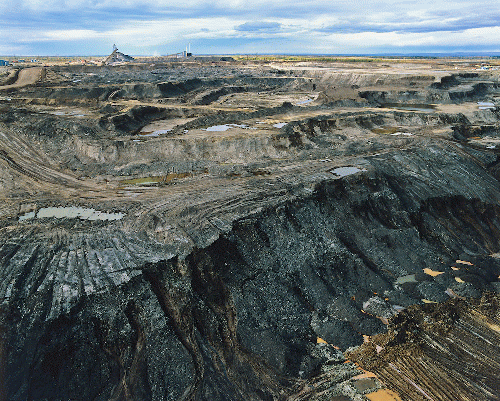From New Yorker
It's like getting a text from an old flame demanding to hear once again why you've broken up. The truth is, I'm not anti-Alberta in the least. I think that it's one of the most beautiful places on the planet, from the ice fields above Jasper to the great delta of the Peace and Athabasca Rivers in Wood Buffalo National Park.
I've lectured at its universities, hiked its trails, had Tegan and Sara high on my playlist. Lake Louise! Lake Minnewanka! The Calgary Stampede! Edmonton has the largest mall in North America. Calgary was once voted the world's cleanest city, edging out Honolulu. What's not to love?
Lay aside for the moment the devastation caused by mining the sludgy tar sands for oil. There's no way that a country with less than one percent of the world's population can lay claim to more than a quarter of the atmosphere.
Some of the retreat was purely financial: in a world that will need less oil, the attraction of going to a landlocked continental interior and trying to separate petroleum from sand is waning. But some of it was in response to those efforts -- banks and oil companies knew that the tar sands were in the spotlight.
The atmosphere can't distinguish Canadian carbon from any other kind; it all heats the planet.
Plenty of Albertans know that the planet is heating up -- in 2019, thousands of them joined Greta Thunberg at a climate rally in Edmonton -- but government and industry can't seem to escape from the dream that their oil boom could just keep going. In fact, they have proposed building a new export terminal in the Arctic Ocean, the ice in which is rapidly melting.
Climate School
� ? � Potentially important news from Somerville, Massachusetts, where a startup company, Form Energy, released new information on what would be a groundbreaking product: a battery that uses cheap iron, not pricey lithium. Because iron is heavy, this battery won't be for cars; instead, it could let utilities store lots of power for days on end, making renewable energy even more competitive with fossil fuels.
� ? � Writing in the Intercept, Naomi Klein does a fiery job of explaining how this summer's extreme weather seems to be reaching people in places that used to be considered safe.
Amazon Watch has issued an important new document explaining why corporations should not be making "net-zero" promises based on "protecting" the rain forest. These pledges don't, the organization points out, compensate for not actually emitting carbon, and, in any event, the forest offsets often end up damaging, not helping, indigenous Amazonians. Meanwhile, activists have launched a major campaign against plans by Brazil's President Bolsonaro to build a "grain train" with a thousand kilometres of track through the eastern Amazon.
Scoreboard
When it comes to emissions, there are factories, airplanes, industrial food systems -- and, apparently, feral boars, which, by pawing through soil around the world, release carbon equivalent to that emitted by a million cars.
Warming Up
Take a look at these five short films from around the globe, focused on a "regenerative world." They are sponsored by the Icelandic artist Olafur Eliasson's Little Sun foundation, which says, "Our aim is that these artworks help to turn an often data-driven and technically heavy conversation surrounding the global energy crisis into an open, intimate dialogue, creating accessible stories and new motivation for global change."






